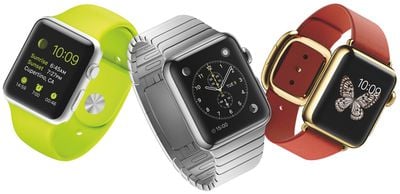Apple Solves Yield Issues with Apple Watch Components, Mass Production Now Slated for January Claims Report
Apple and supply partner Quanta Computer have apparently solved its yield issues with various Apple Watch components as the wearable device is now gearing up to enter mass production in January, reports Taiwan's United Daily News (Google Translate, via GforGames). Previously, other sources projected that the Apple Watch would enter mass production at the end of February.

The report notes that this is due to Quanta increasing its number of employees from 2,000 to 10,000, as the company expects to hire 20,000 employees to help with production. Apple is projecting to ship a total of 24 million Apple Watches in 2015. The United Daily News also mentions how a new "iPhone 6s" will likely miss a Spring debut, but that is to be expected as production of a new A9 chip has yet to gear up. The launch would also be unlikely as Apple's iPhones have never launched in the Spring.
Employee comments made after the Apple Watch's debut in September noted that Apple may not be planning to launch the device until February 2015 or later, as the company originally planned to have the watch ready to ship in time for the 2014 holiday season. However, it is now possible that Apple has solved many of the issues surrounding production of the Apple Watch and will make its "early 2015" release projection. When it goes on sale, the Apple Watch will be available in a variety of materials with several different band choices and start at $349.
Popular Stories
iOS 19 will not be available on the iPhone XR, iPhone XS, or the iPhone XS Max, according a private account on social media site X that has accurately provided information on device compatibility in the past.
The iPhone XR, iPhone XS, and iPhone XS Max all have an A12 Bionic chip, so it looks like iOS 19 will discontinue support for that chip. All other iPhones that run iOS 18 are expected...
Apple today released watchOS 11.4, the fourth major update to the operating system that runs on the Apple Watch. watchOS 11.4 is compatible with the Apple Watch Series 6 and later, all Apple Watch Ultra models, and the Apple Watch SE 2.
watchOS 11.4 can be downloaded on a connected iPhone by opening up the Apple Watch app and going to General > Software Update. To install the new software,...
Apple today released new firmware updates for all AirPods 4 and AirPods Pro 2 models. The new firmware is version 7E93, up from the 7B21 firmware that was installed on the AirPods Pro 2 and the 7B20 firmware available on the AirPods 4 and AirPods 4 with ANC.
It is not immediately clear what new features or changes are included in the new firmware, but we'll update this article should we find ...
Apple today released iOS 18.4 and iPadOS 18.4, the fourth major updates to the iOS 18 and iPadOS 18 operating system updates that came out last year. iOS 18.4 and iPadOS 18.4 come two months after Apple released iOS 18.3 and iPadOS 18.3.
Subscribe to the MacRumors YouTube channel for more videos.
The new software can be downloaded on eligible iPhones and iPads over-the-air by going to...
While the iPhone 17 Pro and iPhone 17 Pro Max are not expected to launch until September, there are already plenty of rumors about the devices.
Below, we recap key changes rumored for the iPhone 17 Pro models as of March 2025:
Aluminum frame: iPhone 17 Pro models are rumored to have an aluminum frame, whereas the iPhone 15 Pro and iPhone 16 Pro models have a titanium frame, and the iPhone ...
Visa wants to pay Apple approximately $100 million to be the new payment network for the Apple Card, reports The Wall Street Journal. As of right now, the Apple Card is on the Mastercard payment network, but that is set to change because Apple is ending its partnership with Goldman Sachs.
Both American Express and Visa are vying to replace Mastercard as Apple's card services provider, while...
Apple today seeded the first betas of upcoming iOS 18.5 and iPadOS 18.5 updates to developers for testing purposes, with the software coming just two days after Apple released iOS 18.4 and iPadOS 18.4.
iOS 18.5 and iPadOS 18.5 can be downloaded from the Settings app on a compatible device by going to General > Software Update.
We don't yet know what Apple is introducing in the iOS 18.5...






















